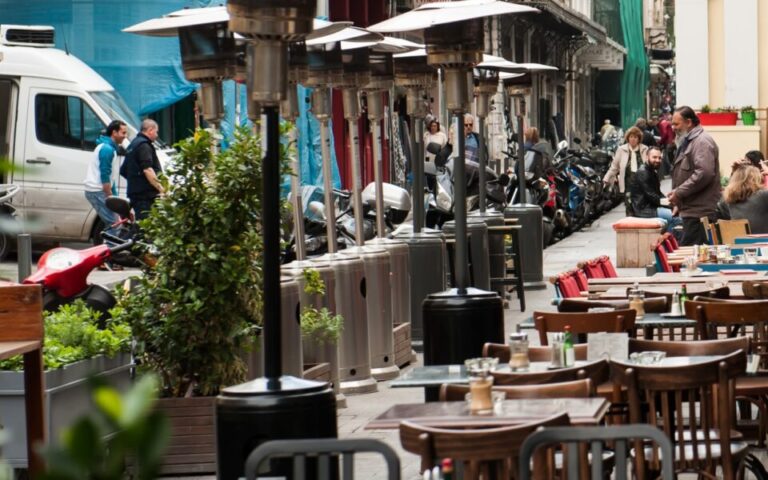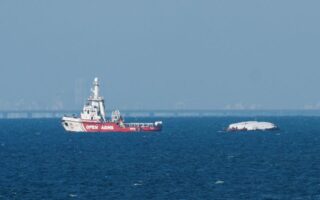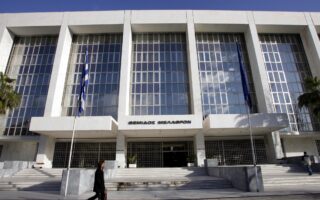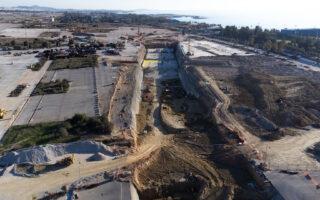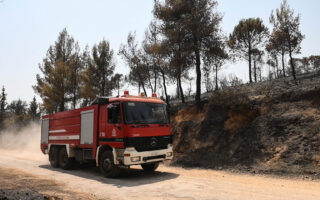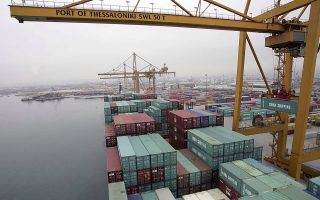More violations of the regulations on the placement on table seating in public places were recorded in the first quarter of the year in Athens, data from the Athens Municipality has shown.
Police in Patra made 25 arrests on Friday after a group of young people attacked police and wrote slogans on city buses.
Aid shipments to Gaza from Cyprus resumed late on Friday, a Cypriot source said, with a ship carrying food to the besieged Palestinian enclave after a pause following Israel’s killing of seven aid workers.
A Thessaloniki prosecutor has brought criminal charges against two men who were arrested for shooting and killing a dog in the municipality of Thermi, southeast of the northern port city.
The Paris Olympics flame has been formally handed to French organizers in the all-marble stadium in Athens where the first modern Games were held in Athens in 1896.
The Supreme Court has fired five judges for breach of duty after finding that they obstructed justice by delaying decisions.
The email addresses of thousands of Greek voters abroad were leaked between May and June 2023, an Interior Ministry internal audit has found.
The eerie, orange-hued phenomenon of the Saharan dust blanketing Athens during the week has been captured by a time-lapse video released by Meteo weather service of the National Observatory of Athens.
Patra ranks as the second least walkable city in the world, trailing only behind Johannesburg, South Africa, a recent study has found.
A man died on Friday morning after falling on the tracks at ISAP electric railway’s Nea Ionia station in northern Athens, authorities said.
The Environment MInistry has opted for a compromise solution to deal with the opposition of municipal mayors to provisions in the new building regulation regarding the maximum heights of buildings.
A total 314 World War Two bombs have been discovered during work on a massive urban development project at the former airport complex of Elliniko south of Athens, according to local authorities.
The three-member Court of Criminal Appeals of Ioannina in northwestern Greece sentenced the former first instance prosecutor of the Ionian island of Corfu to five years in prison on Thursday.
Six out of 10 citizens are dissatisfied with state of public health services, according to a survey conducted in March on behalf of the Panhellenic Medical Association by GPO, on a sample of 1,108 people over the age of 17 in all regions of Greece.
A fire erupted Thursday in Aghios Stefanos, within the Monemvasia municipality in Lakonia.
A 61-year-old man named in a European Arrest Warrant issued by Italian authorities for involvement in a criminal organization, forgery and tax evasion was arrested in the Athenian suburb of Paleo Psychiko on Wednesday.
Customs inspectors from the Hellenic Authority for Communication Security and Privacy (AADE) discovered and seized a substantial quantity of narcotics in raw form at the Port of Piraeus.
Greek authorities are scrutinizing a container of chemical substances discovered at the Attica port of Piraeus.
Fifty-four female tattoo artists from Greece will showcase their work at the “Womanity” exhibition taking place at the HeartbeatInk Gallery (20 Botsari), a new art space in downtown Athens.
The trial of a police officer involved in a road accident that killed a 23-year-old motorcyclist outside the Greek Parliament started on Thursday, after three postponements.
A few days before the big Easter exodus of huge numbers of visitors and with the start of the summer season looming, concern is growing over the serious shortcomings of the National Health System (ESY) units on the Greek islands.
The Deputy Prosecutor for Appeals in Larisa, Katerina Matsi, accepted on Thursday an appeal to investigate a possible tampering with the scene of the deadly train crash in Tempe last year, in a lawsuit that includes the names of politicians.
